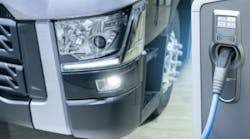Rival OEMs finalize deal on European EV charging network
The three large commercial vehicle OEMs are otherwise competitors, but a collaboration on a large European electric-vehicle charging network among truck manufacturers Daimler Truck, Volvo Group, and Volkswagen truck and bus subsidiary Traton Group was finalized last week—and it joins private and public infrastructure efforts in the U.S. that eventually will be necessary to support widespread electric trucking adoption in America.
The three OEMs completed the final step July 8 in forming the joint venture for charging infrastructure in Europe, which had been announced previously. The venture, with charging network veteran Anja van Niersen appointed as CEO, is expected to play a significant role in supporting the European Union’s Green Deal for carbon-neutral freight transportation by 2050, according to a release from the three trucking OEMs.
See also: U.S. fleets and their customers are driving decarbonization
As announced last year, the joint venture plans to install and operate at least 1,700 high-performance green energy charge points on or close to highways as well as at logistics hubs across Europe, according to the OEMs' release. The three plan to invest 500 million euro ($500.6 million), which is likely the largest charging infrastructure investment in the European heavy-duty truck industry to date.
Most recently, van Niersen served as CEO and later as chairman of the board of the European electric vehicle charging network provider Allego. She brings "a breadth of experience from the energy and charging industry sector" to the joint venture, which pledged “reliable and accessible high-performance charging stations for all battery-electric heavy-duty vehicle fleet operators,” according to the release.
“This kick-start is a call to action to all other industry players, as well as governments and policymakers, to work together for a rapid expansion of the necessary charging network as well as investing in renewable energy in order to reach Europe’s climate targets,” the joint release added. “As a clear signal to all stakeholders, the charging network initiated by the three parties will be open and accessible to all heavy commercial vehicles in Europe, regardless of brand.”
Martin Daum, Daimler Truck’s CEO, also said: “It is crucial that we are now taking the initiative for building up the much-needed charging network. Still, we call on the entire industry to join in our effort. The number of charge points has to increase significantly as fast as possible to make electric long-haul trucking a viable solution for our customers.”
“To find the best solutions for the climate challenge is our most urgent priority as an industry and as the Traton Group,” said Traton CEO Christian Levin. “When we talk to customers about electric trucks, they always ask: Where can we charge? To support as fast as possible, we are teaming up and from today on kick-starting the European charging network.”
See also: EV fleet-as-a-service provider secures $50M for expansion
Martin Lundstedt, president and CEO Volvo Group, also weighed in. “This is a long-awaited and major step towards achieving the required charging infrastructure for the roll-out and success of battery-electric long-haul trucks and coaches. We are making what would be impossible for one actor alone to accomplish—this strong partnership is a significant milestone and accelerator towards carbon neutral transport in Europe by 2050.”
The lack of public charging infrastructure along major freight routes ranks highly with U.S. long-haul fleets in their reasons for doubting the long-term viability of using all-electric Class 8 tractors in their operations—that and the limited range of the vehicles themselves, which are already manufactured by Daimler (subsidiary Freightliner’s eCascadia) and Volvo (the VNR Electric).Where EV adoption in the U.S. is thriving is in urban pickup-and-delivery, regional (though limited mostly to California), and some vocational applications, although upfitters are still sorting the weight requirements and battery limitations for their add-on bodies and equipment for EVs. The use cases for EV applications in U.S. trucking are being shown regularly, most recently the conversion of medium-duty box trucks to all-electric drivetrains.
Electric vehicles are selling rapidly in the U.S. as well—400,000 in 2021 compared to barely 10,000 in 2012—but the country only has 6,000 fast-charging DC stations outside of those that reside on private property, meaning public charging for commercial vehicles is extremely limited except at fleets such as Pitt Ohio and others that are building and maintaining charging depots at their own terminals to service their own vehicles.
The Biden administration took a step forward June 9 toward construction of a national network of 500,000 vehicle chargers that also would be available to commercial vehicles, announcing a U.S. Department of Transportation rulemaking that proposes minimum standards for projects funded under the National Electric Vehicle Infrastructure (NEVI) program. That news followed the announcement earlier this year that $5 billion would be made available to states over the next five years under the NEVI program, which was established by last year’s Infrastructure Investment and Jobs Act to build a national EV charging network.





